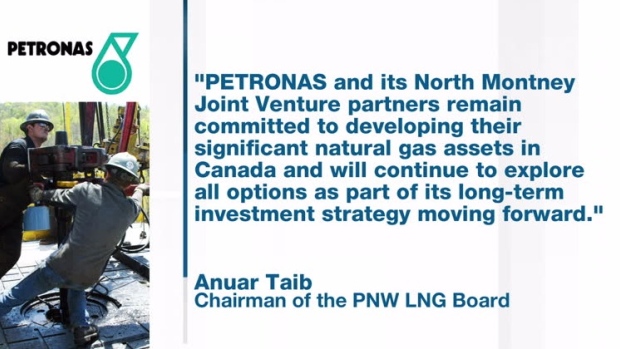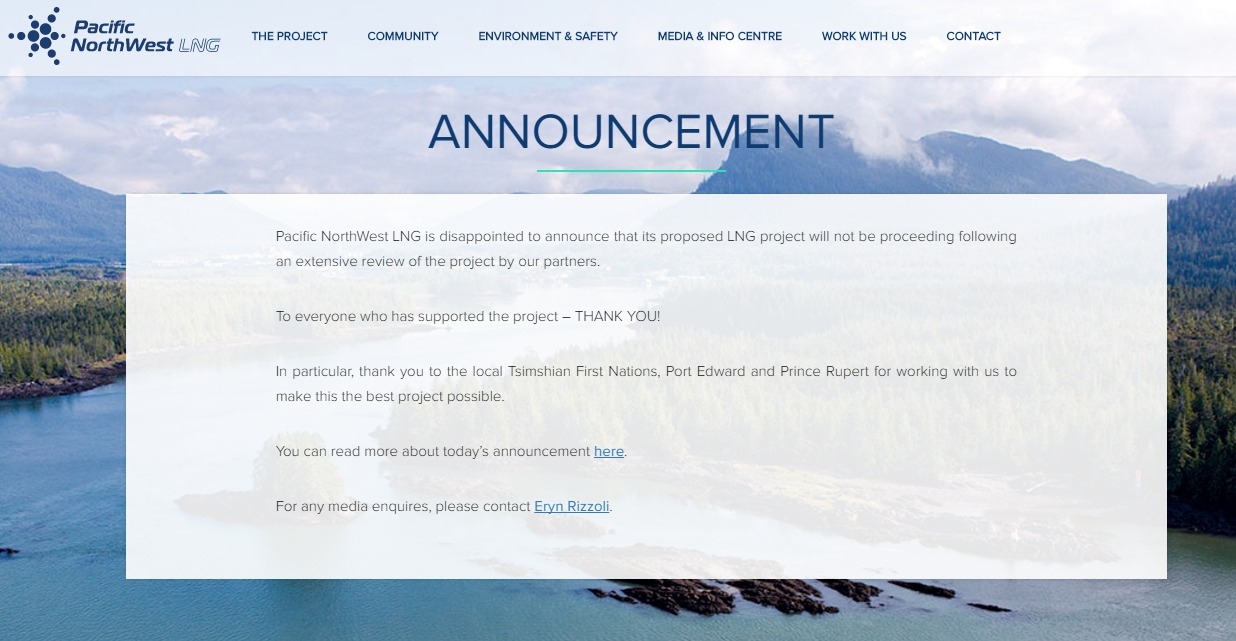Jul 25, 2017
Petronas scraps $11.4B Pacific Northwest LNG project
The Canadian Press

Malaysian national energy giant Petronas and its partners scrapped the Pacific NorthWest LNG megaproject Tuesday, ending months of anticipation on the fate of what would have been one of Canada's largest private infrastructure investments.
The decision to cancel the development boiled down to simple economics -- a world market awash in liquefied natural gas, which has driven down prices, making Pacific NorthWest LNG no longer financially viable, said Anuar Taib, CEO of Petronas's oil and gas production division.
"Unfortunately for us, we don't believe we have that mix of where the sweet spot can be hit," Taib said.

While Pacific NorthWest LNG worked its way through regulatory channels over the last several years, numerous LNG projects have come online around the world.
The overall project would have cost $36 billion in total, including a 900-kilometre pipeline proposed by TransCanada (TRP.TO) to a natural gas export terminal on the province's Lelu Island, as well as the production of gas to supply it.
Canoe Financial Senior Energy Portfolio Manager Rafi Tahmazian told BNN in an interview on Tuesday that the decision to scrap the project has simply sent business to another country.
"We did this under the guise of environmental concern," Tahmazian told BNN. "Well, okay, we’re not doing it."
"That void that we created? Someone else took it. Some other country is benefitting from this and we’re not."
TransCanada later said it was reviewing its options on the $5-billion Prince Rupert Gas Transmission project, which was dealt its own setback last week after the Federal Court of Appeal ruled that the National Energy Board will need to reconsider whether it requires federal approval.
"With this news, we are reviewing our options related to our proposed Prince Rupert Gas Transmission (PRGT) project as we continue to focus on our significant investments in new and existing natural gas infrastructure to meet our customers' needs," Karl Johannson, TransCanada's executive vice-president and president, Canada and Mexico natural gas pipelines and energy said in a statement.
"As part of our agreement with PETRONAS affiliate, Progress Energy, following receipt of a termination notice, TransCanada would be reimbursed for the full costs and carrying charges incurred to advance the PRGT project. We expect to receive this payment later in 2017."
The export facility, with an estimated cost of $11.4 billion, would have compressed the natural gas into liquid form before it would be shipped to markets in Asia.
The announcement Tuesday came a couple of hours after Prime Minister Justin Trudeau met with British Columbia Premier John Horgan in Ottawa. The federal government gave its conditional approval to the project last September. Horgan voiced opposition to it, though late last month he said his position may be swayed if the concerns of First Nations were taken into consideration.
Both the federal and provincial governments emphasized that the decision was a private sector one.
"The company was very clear: this was a decision they are making because of the economic challenges in the global energy market place," B.C. Energy Minister Michelle Mungall said.
"The Pacific Northwest LNG project as proposed in its current state was uneconomical to move forward."
Mungall said the government would work to make B.C. competitive in the global LNG industry as other proposed West Coast LNG projects sit in various stages of development.

The B.C. Liberal caucus was quick to lay blame on what it called a "closed for business" agenda of the newly sworn-in B.C. NDP government.
But when asked whether the election of the NDP played any role in the decision, Taib gave an unequivocal no. He said Petronas is still committed to working on developing the natural gas assets in northeastern B.C. it bought in part to supply the LNG terminal.
"We actually look forward to working with John Horgan and his government as we develop our vast assets in the Montney joint venture area," he said.
B.C. Green Leader Andrew Weaver, who is helping prop up the NDP government in a coalition, said the singular pursuit of the LNG industry by the former B.C. Liberal government was a mistake.
"B.C.'s future does not lie in chasing yesterday's fossil fuel economy," Weaver said in a statement. "It lies in taking advantage of opportunities in the emerging economy in order to create economic prosperity in B.C."
Environmentalists and some First Nations welcomed news of Pacific NorthWest LNG's demise, saying it would have resulted in a spike in greenhouse gas emissions and threatened salmon spawning habitat.
"We're absolutely thrilled that the Malaysian backers of this liquefied natural gas terminal have backed down from their reckless plan to jeopardize B.C.'s second largest salmon run and blow our provincial climate targets," Peter McCartney, climate campaigner for the Wilderness Committee, said in a statement.

- with files from BNN.ca
TIMELINE: PACIFIC NORTHWEST'S LNG PROJECT
Feb. 19, 2013: Pacific NorthWest LNG submits its project description to the Canadian Environmental Assessment Agency.
April 29, 2013: Japan Petroleum Exploration Co. Ltd. buys a 10 per cent stake in Pacific NorthWest LNG and agrees to buy 10 per cent of the liquefied natural gas produced over at least 20 years, becoming the first secure buyer.
Dec. 16, 2013: The National Energy Board grants Pacific NorthWest LNG a licence to export up to 22.2 million tonnes of LNG annually for 25 years. It had applied in July for a licence to export up to 19.68 million tonnes, beginning in 2019.
Feb. 28, 2014: Pacific NorthWest LNG submits its environmental impact statement to the Canadian Environmental Assessment Agency.
March 26, 2014: The federal government approves Pacific NorthWest LNG's export licence.
June 11, 2015: In what it calls its final investment decision, Pacific NorthWest LNG announces it will proceed with the project as long as it satisfies two conditions: approval of a project development agreement by the B.C. legislature and clearing the federal environmental assessment review process.
July 21, 2015: The B.C. government passes legislation to ratify a project development agreement with Pacific NorthWest LNG.
March 21, 2016: The federal government grants the Canadian Environmental Assessment Agency more time to review the project.
Sept, 27, 2016: The federal government approves the project with 190 conditions, including for the first time a maximum cap on greenhouse gas emissions.
Oct. 27, 2016: Two First Nations and an environmental group file separate applications for judicial review in Federal Court to quash approval of the project. A fourth challenge is launched in January 2017.
July 25, 2017: Pacific Northwest LNG says it will not proceed with the project, citing poor market conditions including a prolonged period of low LNG prices.



